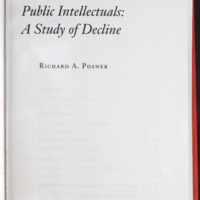-
Title
-
Public intellectuals : a study of decline
-
Description
-
A study of the modern American public intellectual who speaks to the public on issues of political or ideological subjects.
-
Identifier
-
991764
-
067400633X
-
Creator
-
Posner, Richard A
-
Source
-
Brian Lamb Booknotes Collection
-
Gift of Brian Lamb, 2011.
-
Catalog record
-
Language
-
eng
-
Date
-
2001
-
Program air date: June 2, 2002.
-
Publisher
-
Harvard University Press
-
George Mason University. Libraries. Special Collections & Archives
-
Subject
-
"Political planning--United States."
-
"Intellectuals--United States."
-
"Specialists--United States."
-
Relation
-
Original Booknotes interview
-
Rights
-
This work may be protected by copyright laws and is provided for educational and research purposes only. Any infringing use may be subject to disciplinary action and/or civil or criminal liability as provided by law. If you believe that you are the rights-holder and object to Mason’s use of this image, please contact speccoll@gmu.edu.
-
Text
-
Transcription of Annotations
Extensive notes on front and back end papers. The decline, on page 311--you call yourself a sourpuss; The Declinists Putnam Left, Bork Right. Posner grew-up in 50's statements of likes/dislikes p. 319. "What is your reaction when you see an academic public intellectual on TV?" "Have you ever signed an ad or public letter about a political issue?" New York Post "an angry conservative tabloid" omit Atlantic Monthly--seems to have no political leaning. Mon. 15 Apr. noon. Public intellectual has not been studied before. Russell Jacobs coined term in 1987; John Rawls--who is he--why don't we know him; Jews verbal IQ p. 183; "focus of the book is on academic public intellectual" p. 107; Signed ads by academics: Clinton Impeachment, 2000 Election; Tenure--what's it impact; Shakespeare, Dickens, Henry James, T.S. Eliot, p. 227. Brave New World--Al Extensive notes on front and back end papers. The decline, on page 311--you call yourself a sourpuss; The Declinists Putnam Left, Bork Right. Posner grew-up in 50's statements of likes/dislikes p. 319. "What is your reaction when you see an academic public intellectual on TV?" "Have you ever signed an ad or public letter about a political issue?" New York Post "an angry conservative tabloid" omit Atlantic Monthly--seems to have no political leaning. Mon. 15 Apr. noon. Public intellectual has not been studied before. Russell Jacobs coined term in 1987; John Rawls--who is he--why don't we know him; Jews verbal IQ p. 183; "focus of the book is on academic public intellectual" p. 107; Signed ads by academics: Clinton Impeachment, 2000 Election; Tenure--what's it impact; Shakespeare, Dickens, Henry James, T.S. Eliot, p. 227. Brave New World--Aldous Huxley; 1984--George Orwell. Technology--most of today's philosophers/public I have deep misgivings about the present left and right. Lawyers--commentary on the law. Sean Wilentz 1. real time commentary, 2. expert witness; what's the influence of public intellectuals on Judges--conservative Judges socialize with conservative intellectuals. OWH, Brandeis, Frankfurter, Ben. Cardozo, Learned Hand. Most lawyers are unfit to play role of P.I. p. 386; Jean Bethke Elstain's definition of a P.I.'s role. New York Review of Books say they don't have a particular slant. John Stuart Mills, p. 356--greatest public intellectual, half Republican/half Democrat--On Liberty meant for public academics short doesn't quote a lot of people. Oliver Wendell Holmes. Jr.--his hero. Clerk to Bill Brennan, worked for Thurgood Marshall, taught at Stanford, Yale undergrad. The Public Philosophers: Martha Nussbaum shares reformist goals vs. Richard Rortz--he's our Geo. Orwell. Amartya Sen. My book "An Affair of State" Ronald Dworkin, "Breaking the Deadlock the 2000 election, the constitution and the courts" 2001. Microsoft. List of 12 public intellectuals including: George Orwell, Alan Dershowitz, John Dewey, Allan Bloom, John Stuart Mills. Public intellectual writings remain nebulous. Notes and underlinings: Clinton impeachment, Microsoft antitrust. "Public intellectual"--random and chaotic. Decline of public intellectual (P.I.). Modern public intellectuals: Milton Friedman, Henry Kissinger, Gary Wills. Academic freedom, academic public intellectuals: Hannah Arendt, Michael Foucault, Leo Strauss, Amartya Sen. Social sig. of P.I.s deteriorating. Socrates patron saint of public intellectuals. 13.5 years as tenured professor. Intellectual, interested in things of the mind; does not mean cultured, cultivated or bookish; not synonym for intelligent. 20th cent. intellectuals: Bertrand Russell, Edmund Wilson, George Orwell, etc. Intellectual gained currency during "Dreyfus Affair" writers/thinkers part of public debate. Scientists: Paul Ehrlich, Stephen Jay Gould, etc. Semipublic intellectuals: Thomas Jefferson, Woodrow Wilson, Newt Gingrich, William Bennett, William Kristol. Machiavelli, Milton, Locke, Montesquieu. Nonacademic's writing for nonacademic's. Dogmas cultural Left, Austrian school of economics, followers of Leo Strauss. P.I. social critic vs. social observer. Think tanks. P.I. accessible to the public. P.I. high failure rate as real-time commentator--op-ed Aldous Huxley's, book reviews, radio/tv appearances, teach-in, full page ad. Tenure. All specialists. Chomsky, U.S. foreign policy. Academic intellectual--fish out of water. Clinton affair, Robert Bork, 2000 election. p. 122
 991764.pdf
991764.pdf